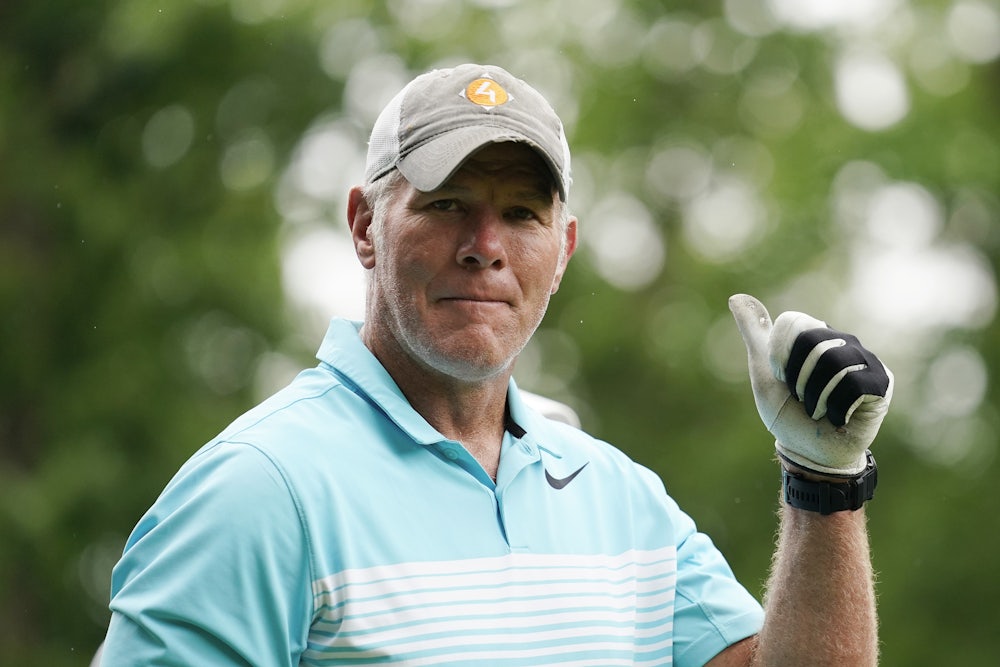Brett Favre is known as one of the finest NFL quarterbacks ever. In a career spanning nearly two decades, most of it with the Green Bay Packers, he won a Super Bowl and three MVP trophies, earned 11 Pro Bowl nods, and set the all-time record for the most consecutive starts. In 2016, he was elected to the Pro Football Hall of Fame.
But Favre’s latest chapter ought to soil his entire legacy: his alleged role in a widespread plot to siphon millions of dollars in public money meant to help the poorest people in his state.
Nonprofit newsroom Mississippi Today has spent months uncovering numerous revelations about the scandal. Its work detailed how Favre, who has made around $140 million in his career, allegedly collaborated with state officials to funnel $8 million from a Mississippi welfare fund to build a volleyball court at the college his daughter would attend and fund research at two pharmaceutical companies he was invested in. Since these revelations have come to light, Favre has shirked responsibility for his role in what may be the deepest case of public corruption his home state has ever seen.
The gravitational center of Favre’s misdeeds involved a massive pool of more than $77 million in Temporary Assistance for Needy Families, or TANF, funding, which the federal government distributes to the states through grants. Perhaps no other state needs such assistance more than Mississippi, which has the highest poverty rate in the nation, with about one-fifth of its population living below the poverty line. Fifteen percent of the population is food insecure, and the state has the nation’s lowest life expectancy.
The Mississippi Department of Human Services, or MDHS, doled out $98 million in total to two nonprofits: the Family Resource Center and the Mississippi Community Education Center, or MCEC. Both nonprofits helped administer an anti-poverty program called Families First for Mississippi, and both would instead questionably spend or improperly disperse over $94 of the $98 million, including the $77 million TANF funding.
Favre’s role in the welfare-swiping saga began six years ago. In December 2016, according to text message records recovered by Mississippi Today, Favre began conversing with the University of Southern Mississippi, his alma mater, about building a volleyball facility for the team his daughter would go on to play for. Texts between Favre, then Republican Governor Phil Bryant, and MCEC head Nancy New revealed a clear plan to take the TANF funds and build the facility. By December 2017, MCEC had arranged for $5 million of the TANF-dispersed funding to be doled out to the university. At one point, Favre texted Bryant about “trying to save money on Vball facility,” suggesting employing the “prison industry as a builder” for lockers.
MCEC also distributed $1.1 million—split into two payments, one in December 2017, the other in June 2018—to Favre directly, ostensibly in exchange for him to deliver speeches promoting the state’s Families First program but really to try to raise more money for the facility. (Favre did not end up delivering those speeches, and when forced by the state, eventually paid back the fees.)
Favre also helped divert welfare funds to pharmaceutical companies Prevacus and PresolMD, which sought to bring experimental concussion-treating drugs to the market. Favre was a top investor in and adviser to the companies. In January 2019, he helped the companies successfully secure $2.1 million more from New’s welfare grant money pool. In return, the companies were to carry out trials and manufacturing in the state.
Prevacus didn’t end up conducting much development or many trials in Mississippi. The trials that have been done, however, have shed doubt on how effective the drugs are at all.
Six people have been charged thus far in the web of welfare fraud Favre is enmeshed in. John Davis, executive director of the MDHS, has pleaded guilty to five state counts of conspiracy and 13 state counts of fraud against the government; he also pleaded guilty to one federal charge of conspiracy and one federal charge of theft. New, of the MCEC, pleaded guilty to multiple charges of bribery of a public official, fraud against the government, mail fraud, and racketeering. Both agreed to cooperate with the investigation and testify against others as part of their pleas.
Favre has avoided criminal consequences for now. He has claimed ignorance of any wrongdoing, while the investigation is ongoing. In the meantime, MDHS has updated an already existing lawsuit against Favre and the university foundation. Instead of maintaining its demands for $1.1 million—as Favre has now repaid the money for unfulfilled public speeches—MDHS now wants Favre to pay back the $5 million used to pay for the volleyball facility and the $2.1 million diverted to the pharmaceutical companies.
Favre and his legal team (led by former Trump White House lawyer Eric Herschmann) are not only seeking to remove him from this lawsuit but also demand up to $5 million in restitution.
“I have been unjustly smeared in the media. I have done nothing wrong, and it is past time to set the record straight,” Favre said in a statement to CBS News in October, after the outlet reported that Prevacus’s CEO solicited $2 million in welfare funds from Mississippi officials in Favre’s own home. A document from the meeting clearly detailed the plans to secure the welfare money. “No one ever told me, and I did not know, that funds designated for welfare recipients were going to the university or me,” Favre claimed.
Reporting from Mississippi Today also reveals additional text conversations spanning years showing Favre coordinating with Bryant, New, and Davis to collect funds for the stadium and pharmaceutical venture. And Favre seemed aware of risks at hand. “If you were to pay me is there anyway the media can find out where it came from and how much?” Favre texted New.
Such brazenness from Favre is unsurprising. In 2008, the married man sent reporter Jennifer Sterger explicit photos, text messages, and voicemails, asking her to come to his hotel room. Favre admitted to sending the voicemails but not the images, and was later fined $50,000 for failing to cooperate with the investigation. The league “could not conclude” whether Favre had violated any personal conduct policy.
In September of this year, Sterger wrote that she believes in redemption when people express remorse and how they’ve learned from their mistakes. But, she wrote, “Brett Favre has done none of that. I’m roadkill in his rear view.” On his involvement in the Mississippi welfare scandal, she added, “You all are just now discovering that awful people do awful things when there are no consequences.”
At a 2004 press conference, Favre tried to claim he’s just like everyone else. “Sometimes, you get caught up in what’s going on around you,” he said. “The reality is that you are just a regular person. At some point, the career will be over; the bright lights turn off. That can come back to haunt you if you’re not just a regular guy.”
But Favre is anything but regular. Though grotesquely wealthy already, he has pursued spurious ego projects with unyielding greed and an absence of scruples, attempting to further enrich himself at the expense of the real “regular” people of Mississippi.








